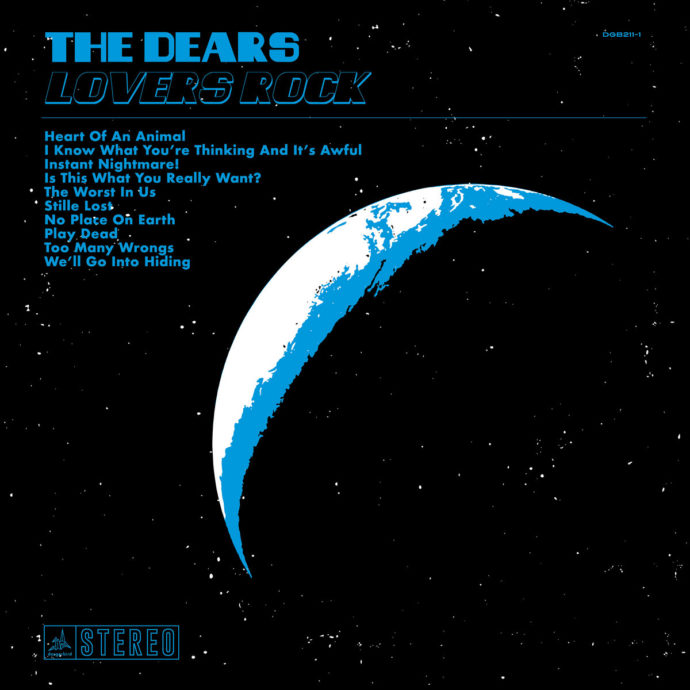How does one describe The Dears to someone who’s never heard them? How about: If The National were from Canada, they’d be The Dears? Perhaps that’s giving The National too much credit. After all, The Dears started before The National and, as anyone who cares deeply about melodramatic indie rock bands knows, The National are just the American version of Tindersticks. At the end of the day, do comparisons like these really entice anyone to listen to something they haven’t, or are they only ever just a cryptic way for indie snobs to show off? It doesn’t matter. What does matter is that it’s 2020 and the Montreal indie rock band The Dears, led by the married couple Murray Lightburn and Natalia Yanchak, have now been making music for over two decades, and their latest album, Lovers Rock, is upon us.
Lovers Rock opens with, “Heart of an Animal”, a five-minute epic that begins with a simple beat, descending piano, and emotive strings and oboe as Lightburn sings about being disappointed by aging. Soon, the drums loosen, and the song takes off with Lightburn repeating a two-part chorus of which the first lines cleverly alternate between the words “You will see” and “Luuuunacy”. Halfway into “Heart of an Animal”, the tempo downshifts into something akin to the Beatles’ “Golden Slumbers”, but with foreboding lyrics that end with the line, “It’s a cold… way… to diiiiiiiie.”
For those new to The Dears, “Heart of an Animal” is a trial by fire right out of the gate. Those who stick around will be rewarded with the gorgeous “I Know What You’re Thinking and It’s Awful”. This mid-tempo number has Lightburn sounding like a brooding R&B singer complete with Yanchak acting as her husband’s backing vocalist as he croons, “Ooh, I can’t forget it, I can’t forget it, I’m not over you.” “I Know What You’re Thinking…” is one of Lovers Rock’s best moments and an obvious standout amidst The Dears’ latest crop of singles.
When compared with the bleakness of the record’s overall tone lyrically, “Is This What You Really Want?” comes across as one of the more lyrically optimistic moments on the album. Yanchak can be heard again on this one as she echoes Lightburn’s ruminations on time during the chorus, singing, “And since, all these years, is it still the same old song? Can we ever look beyond?” While not a complete ray of sunshine, the song does differentiate itself amidst the album’s vast darkness by including bright, back-to-back guitar and sax solos in addition to Lightburn tossing in some cheery “la, la, las” during the song’s final minute.
“The Worst in Us” is the record’s centerpiece, but it feels misplaced in Lovers Rock’s sequence. This is where things begin to fall apart. With its upbeat breakdown that sounds like Madness’ “Our House”, the track seems like it would have been more appropriate as the album’s finale. The songs that follow find the band sliding further away from the darkly serious tone of the record’s first few songs. “Stille Lost” is an odd number that pairs a reggae beat with a theremin-like synth and an oddly swaggering saxophone. At over five minutes in length, and with lyrics largely consisting of Lightburn simply repeating, “We’re lost, and nobody gives a damn,” the track is an exercise in listener patience.
Unfortunately, Lovers Rock never again regains the glory it achieved with its initial three tracks. The sappy, AM radio-esque “Too Many Wrongs” is the album’s penultimate track, and by this point you’re just looking forward to the entire ordeal to be over. The last two minutes of the six-minute “We’ll Go into Hiding”, the record’s closer, manages to somewhat recoup the damage done by most of Lovers Rock’s woeful second side, but it’s too little, too late. The Dears started strong with deep, serious-sounding instrumental pieces that felt appropriate when matched with Lightburn’s thoughtful, emotionally weighty lyrics, but the whole thing went off the rails when the band began to lean on trite musical clichés, so much so that even Lightburn’s vocals and lyrics couldn’t save them.
Rating: 5.0/10

